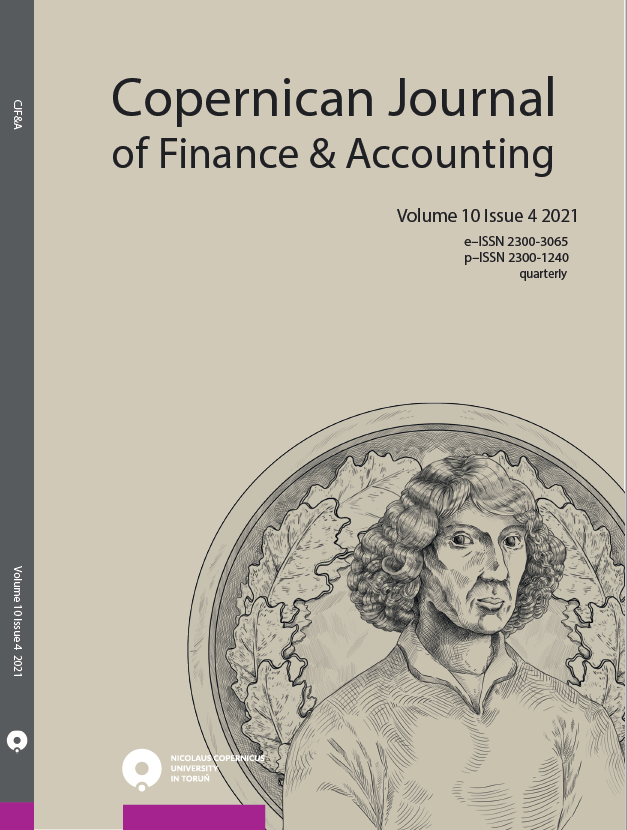RISK-RETURN RELATIONSHIP IN THE NIGERIAN STOCK MARKET DURING PANDEMIC COVID-19: SECTORAL PANEL GARCH APPROACH
DOI:
https://doi.org/10.12775/CJFA.2021.017Keywords
COVID-19, risk-return, news, GARCHAbstract
This study examines how the Nigerian Stock Exchange (NSE) is responding to the COVID-19 pandemic in the form of risk-return relationship and volatility. Panel data analyses of GARCH-in-mean and Threshold GARCH were estimated on three error distributional assumptions. All Share Index (ASI) from January 2020 to December 2020 for ten stock market indices on the NSE. Findings indicate that the cross-section return of the ten stock market indices returns exhibit a positive risk-return relationship during COVID-19 and the impact of bad news was found to have no significant impact on return volatility on the NSE. This indicates that the policy response during the pandemic is adequate to cushion the negative impact of COVID-19, which should be sustained.
References
Alade, E.M., Adeusi, A.S., & Alade, O.F. (2020). Covid-19 pandemic and Nigerian stock market capitalization. Ilorin Journal of Economic Policy, 7(3), 12-23.
Ashraf, B.N. (2020). Stock markets’ reaction to COVID-19: Cases or fatalities? Research in International Business and Finance, 54, 101249. http://dx.doi.org/10.1016/j.ribaf.2020.101249.
Azimli, A. (2020). The impact of COVID-19 on the degree of dependence and structure of risk - return relationship: A quantile regression approach. Finance Research Letters, 36, 101648. http://dx.doi.org/10.1016/j.frl.2020.101648.
Bollerslev, T. (1986). Generalised autoregressive conditional heteroscedasticity. Journal of Econometrics, 31(3), 307-327. http://dx.doi.org/10.1016/0304-4076(86)90063-1.
Brandt, M.W., & Kang, Q. (2004). On the relationship between the conditional mean and volatility of stock returns: A latent VAR approach. Journal of Financial Economics,72(2), 217-257.
Campbell, J.Y., Lettau, M., Malkiel, B.G., & Xu, Y. (2001). Have individual stocks become more volatile? An empirical exploration of idiosyncratic risk. Journal of Finance, 56(1), 1-43. http://dx.doi.org/10.1111/0022-1082.00318.
Cermeño, R., & Grier, K.B. (2001). Modelling GARCH processes in Panel Data: Theory, Simulations and Examples. LACEA 2001: Annual Conference. Montevideo, Uruguay.
Coffie, W. (2015). Modelling and forecasting the conditional heteroskedasticity of stock returns using asymmetric models: Empirical evidence from Ghana and Nigeria. Journal of Accounting and Finance, 15(5), 109-123
Engle, R.F. (1982). Autoregressive conditional heteroskedasticity with estimates of the variance of United Kingdom inflation. Econometrica, 50(4), 987-1007.
Fisher, I.N., & Hall, G.R. (1969). Risk and corporate rate of return. Quarterly Journal of Economics, 83(1), 79-92. http://dx.doi.org/10.2307/1883994.
Ghysels, E., Plazzi, A., & Valkanov, R. (2016). The risk-return relationship and financial crises. SSRN Working Paper, 1-19. http://dx.doi.org/10.2139/ssrn.2776702.
Glosten, L.R., Jagannathan, R., & Runkle, D.E. (1993). On the relation between the expected value and the volatility of the nominal excess return on stocks. Journal of Finance, 48(5), 1779-1801. http://dx.doi.org/10.1111/j.1540-6261.1993.tb05128.x.
Guo, Y.R., Cao, Q.D., Hong, Z.S., Tan, Y.Y., Chen, S.D., Jin, H.J., Tan, K.S., Wang, D.E., & Yan, Y. (2020) The origin, transmission and clinical therapies on coronavirus disease 2019 (COVID-19) outbreak – an update on the status. Military Medical Research, 7(11),1-10. http://dx.doi.org/10.1186/s40779-020-00240-0.
Guo, H., & Whitelaw, R.F. (2006). Uncovering the risk-return relation in the stock market. Journal of Finance, 61(3), 1433-1463. http://dx.doi.org/10.1111/j.1540-6261.2006.00877.x.
Hu, B., Guo, H., Zhou, P., & Shi, Z. L. (2020). Characteristics of SARS-CoV-2 and COVID-19. Nature Reviews Microbiology, 19, 141-154. http://dx.doi.org/10.1038/s41579-020-00459-7.
International Monetary Fund (IMF) (2020a). World economic outlook 2020: The great lockdown, https://www.imf.org/en/Publications/WEO/Issues/2020/04/14/weoapril-2020 (accessed: 12.06.2020).
International Monetary Fund (IMF) (2020b). Global Financial Stability Report, https://www.imf.org/en/Publications/GFSR (accessed: 12.06.2020).
Leon, A., Nave, J., & Rubio, G. (2005). The relationship between risk and expected return in Europe. Journal of Banking and Finance, 31(2), 495-512. http://dx.doi.org/10.1016/j.jbankfin.2006.07.011.
Lettau, M., & Ludvigson, S. (2003). Measuring and modeling variation in the risk-return trade-off. In Y. Aït-Sahalia, L.P. Hansen (Eds.). Handbook of Financial Econometrics. North Holland: Elsevier Science B.V.
Ludvigson, S.C., & Ng, S. (2007). The empirical risk-return relation: A factor analysis approach. Journal of Financial Economics, 83(1), 171-222. http://dx.doi.org/10.1016/j.jfineco.2005.12.002.
Mahmood, I., & Shah, S.Z.A. (2015). Negative relationship between risk and return: A contrary view. Pakistan Journal of Commerce and Social Sciences, 9(2), 336-343.
Merton, R. (1973). An intertemporal capital asset pricing model. Econometrica, 41(5), 867-887.
Nageri, K.I. (2019a). Evaluating good and bad news during pre and post financial meltdown: Nigerian stock market evidence. Studia Universitatis Babeș-Bolyai Oeconomica, 64(3), 1-22. http://dx.doi.org/10.2478/subboec-2019-0012.
Nageri, K.I. (2019b). Evaluating volatility persistence of stock return in the pre and post 2008-2009 financial meltdown. Copernican Journal of Finance & Accounting, 8(3), 73-91. http://dx.doi.org/10.12775/CJFA.2019.013.
Nelson, D.B. (1991). Conditional heteroskedasticity in asset returns: A new approach. Econometrica, 59(2), 347-370.
Neumann, M., Bobel, I., & Haid, A. (1979). Profitability, risk and market structure in West German industries. Journal of Industrial Economics, 27(3), 227-242.
Pastor, L., & Veronesi, P. (2006). Was there a Nasdaq bubble in the late 1990’s? Journal of Financial Economics, 81(1), 61-100.
Raputsoane, L. (2009). The risk-return relationship in the South Africa stock market. Paper presented at the 14th Annual Conference of the African Econometrics Society on Econometric Modelling in Africa, Abuja, Nigeria, 1-13.
Salisu, A.A., Ebuh, G.U., & Usman, N. (202). Revisiting oil-stock nexus during COVID-19 pandemic: Some preliminary results. International Review of Economics & Finance, 69, 280-294. http://dx.doi.org/10.1016/j.iref.2020.06.023.
Salisu, A.A., & Vo, X.V. (2020). Predicting stock returns in the presence of COVID-19 pandemic: The role of health news. International Review of Financial Analysis, 71,101546. http://dx.doi.org/10.1016/j.irfa.2020.101546.
The Nigerian Stock Exchange (NSE) (2020). Nigerian Stock Exchange, https://www.nse.com.ng.
World Health Organisation (WHO) (2020). WHO Director-General’s opening remarks at the media briefing on COVID-19, https://www.who.int/director-general/speeches/detail/who-director-general-s-opening-remarks-at-the-media-briefing-on-covid-19---11-march-2020 (accessed: 03.07.2020).
Zhang, D., Hu, M., & Ji, Q. (2020). Financial markets under the global pandemic of COVID-19. Finance Research Letters, 36, 101528. http://dx.doi.org/10.1016/j.frl.2020.101528.
Downloads
Published
How to Cite
Issue
Section
License

This work is licensed under a Creative Commons Attribution-NoDerivatives 4.0 International License.
Stats
Number of views and downloads: 933
Number of citations: 0



